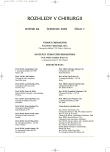-
Medical journals
- Career
Pathophysiology of Postoperative Dysfunctions of the Intestinal Motility. A Review
Authors: P. Maruna 1,2; R. Gürlich 3,4; R. Fraško 4
Authors‘ workplace: Ústav patologické fyziologie, 1. lékařská fakulta UK Praha přednosta prof. MUDr. E. Nečas, DrSc. 1; III. interní klinika Všeobecná fakultní nemocnice a 1. lékařská fakulta UK Praha přednosta prof. MUDr. Š. Svačina, DrSc. 2; Klinika transplantační chirurgie IKEM, přednosta doc. MUDr. M. Adamec, CSc. 3; I. chirurgická klinika Všeobecná fakultní nemocnice a 1. lékařská fakulta UK Praha přednosta doc. MUDr. J. Šváb, CSc. 4
Published in: Rozhl. Chir., 2005, roč. 84, č. 7, s. 356-362.
Category: Monothematic special - Original
Overview
The postoperative motility dysfunction (POI) is a frequent secondary complication of surgical procedures. The POI results from a number of simultaneous factors of both local and systemic nature. Activation of inhibitory neural reflexes and a mediator response to the surgical procedure are among the main ones. Neurohumoral response of the organism to painful stimuli and the effect of the opioid medication used during the perioperative period, are the modulating factors. The intraabdominal procedure with manipulation with the intestine results in activation of the mediator response, followed by increased levels of cytokines and other mediators, inhibiting the smooth intestinal musculature contractility. The extent of the traumatization of the tissue is a principal factor affecting the extent and duration of the POI.
Key words:
laparotomy – opioids – postoperative ileus – inflammation
Labels
Surgery Orthopaedics Trauma surgery
Article was published inPerspectives in Surgery

2005 Issue 7-
All articles in this issue
- Resection of the Trachea with Extracorporeal Circulation as a Simultaneous Procedure during Coronary Artery Bypass Grafting – A Case Report
- Is Obesity a Real Risk Factor in Cardiosurgical Procedures?
- A Postoperative Bronchopleural Fistule – A Success of the Conservative Treatment (a Case Review)
- Allografts in the Vascular Surgery
- Pathophysiology of Postoperative Dysfunctions of the Intestinal Motility. A Review
- An Unusual Cause of the Chronic Ileus State – The Absence of the Intestinal Wall Muscularis Layer
- Small Bowel Carcinoid
- Amoebic Liver Abscess – Case Report
- A Spinal Cord Injury Caused by a Migrating Kirschner Wire Following Osteosynthesis of the Clavicle: A Case Review
- Perspectives in Surgery
- Journal archive
- Current issue
- Online only
- About the journal
Most read in this issue- Pathophysiology of Postoperative Dysfunctions of the Intestinal Motility. A Review
- Small Bowel Carcinoid
- A Postoperative Bronchopleural Fistule – A Success of the Conservative Treatment (a Case Review)
- Amoebic Liver Abscess – Case Report
Login#ADS_BOTTOM_SCRIPTS#Forgotten passwordEnter the email address that you registered with. We will send you instructions on how to set a new password.
- Career

